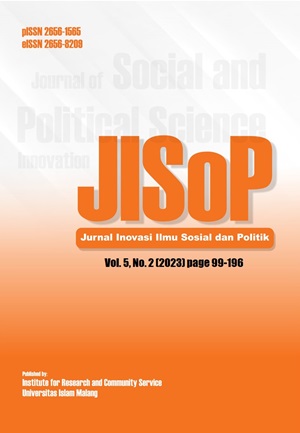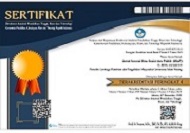Cosmetic company commitment to the international organization for standardization (ISO) as a private authority regime
DOI:
https://doi.org/10.33474/jisop.v5i2.20561Keywords:
ISO 14001, international private regime, the body shopAbstract
This research discusses the ISO private authority regime with a focus on the ISO 14001 series issues regarding the environmental management system at the cosmetics company The Body Shop. The aim of this research is to determine the commitment of The Body Shop through policies as a form of company compliance with the international private regime and its contribution achievements. This research analysis uses concepts International Private Regime and Institutional Theory with descriptive methods of qualitative data analysis collected through documentation study techniques. The results of this research found that the ISO 14001 standard is an international private regime that regulates management systems environment is not a standard of technical performance in companies. In this way, The Body Shop's commitment to ISO 14001 is proven through the existence of a circular economy policy, reducing greenhouse gas emissions towards net zero carbon, to policies related to company design and product raw materials used in order to minimize environmental impacts. This shows that The Body Shop has a high commitment to implementing ISO 14001 standards in its business activities green corporate.
References
Aisya, S., & Febriana, P. (2023). Strategi komunikasi pemasaran The Body Shop melalui brand ambassador: Studi kasus Iqbaal Ramadhan. Satwika : Kajian Ilmu Budaya Dan Perubahan Sosial, 7(1), 200–208. https://doi.org/10.22219/satwika.v7i1.25348
Aravind, D., & Christmann, P. (2011). Decoupling of Standard Implementation from Certification: Does Quality of ISO 14001 Implementation Affect Facilities’ Environmental Performance? Business Ethics Quarterly, 21(1), 73–102. https://doi.org/10.5840/beq20112114
Arocena, P., Orcos, R., & Zouaghi, F. (2021). The impact of ISO 14001 on firm environmental and economic performance: The moderating role of size and environmental awareness. Business Strategy and the Environment, 30(2), 955–967. https://doi.org/10.1002/bse.2663
Arocena, P., Orcos, R., & Zouaghi, F. (2022). The scope of implementation of ISO 14001 by multinational enterprises: The role of liabilities of origin. Journal of Environmental Management, 327(1), 116844. https://doi.org/10.1016/j.jenvman.2022.116844
Baek, K. (2017). The Diffusion of Voluntary Environmental Programs: The Case of ISO 14001 in Korea, 1996–2011. Journal of Business Ethics, 145(2), 325–336. https://doi.org/10.1007/s10551-015-2846-3
Bansal, P., & Bogner, W. C. (2002). Deciding on ISO 14001: Economics, institutions, and context. Long Range Planning, 35(3), 269–290. https://doi.org/10.1016/S0024-6301(02)00046-8
Boiral, O., Guillaumie, L., Heras-Saizarbitoria, I., & Tayo Tene, C. V. (2018). Adoption and Outcomes of ISO 14001: A Systematic Review. International Journal of Management Reviews, 20(2), 411–432. https://doi.org/10.1111/ijmr.12139
Börzel, T. A., & Risse, T. (2005). Public- private partnerships: Effective and legitimate tools of transnational governance? Complex Sovereignty: Reconstituting Political Authority in the Twenty-First Century, 195–216. https://doi.org/10.3138/9781442684201-011
Chalimatuz, Nur, K., & Kusuma, R. (2017). The Effect of Green Marketing Through Corporate Social Responsibility and Brand Image on The Purchase Intention of The Body Shop Customers in Malang. RJOAS: Russian Journal of Agricultural and Socio-Economic Sciences, 5(65), 212–222. https://doi.org/10.18551/rjoas.2017-05.27
Chu, Z., Xu, J., Lai, F., & Collins, B. J. (2018). Institutional theory and environmental pressures: The moderating effect of market uncertainty on innovation and firm performance. IEEE Transactions on Engineering Management, 65(3), 392–403. https://doi.org/10.1109/TEM.2018.2794453
Clap, J. (1998). The Privatization of Global Environmenta: ISO 14000 and the Developing World (p. 297).
Cutler, A. C. (2009). Private international regimes and interfirm cooperation. In R. B. Hal & T. J. Biersteker (Eds.), The Emergence of Private Authority in Global Governance (pp. 23–40). Cambridge University Press. https://doi.org/10.1017/CBO9780511491238.003
Delmas, M. A., & Montes-Sancho, M. J. (2011). An Institutional Perspective on the Diffusion of International Management System Standards: The Case of the Environmental Management Standard ISO 14001. Business Ethics Quarterly, 21(1), 103–132. https://doi.org/10.5840/beq20112115
DiMaggio, P. J., & Powell, W. W. (1983). The Iron Cage Revisited: Institutional Isomorphism and Collective Rationality in Organizational Fields. American Sociological Review, 48(2), 147–160. https://doi.org/10.2307/2095101
Fonseca, L. M. C. M. da. (2015). ISO 14001:2015: An improved tool for sustainability. Journal of Industrial Engineering and Management, 8(1), 35–50. https://doi.org/10.3926/jiem.1298
Hall, R. B. &Thomas J. B. (2002). The Emergence of Private Authority in Global Governance (Issue 1). Cambridge Universitry Press.
Ikbar, Y. (2014). Metodologi dan Teori Hubungan Internasional. PT. Refika Aditama.
ISO. (2013). ISO 14001 Continual Improvement Survey 2013 (Issue February).
ISO. (2015). ISO 14001 Key Benefit.
ISO. (2019). ISO in brief: Great Things Happen When the World Agrees.
ISO. (2022a). About ISO.
ISO. (2022b). Popular Standart.
Krasner, S. D. (1983). International Regime. Cornell University Press.
Krell, K., Matook, S., & Rohde, F. (2016). The impact of legitimacy-based motives on IS adoption success: An institutional theory perspective. Information and Management, 53(6), 683–697. https://doi.org/10.1016/j.im.2016.02.006
Lestari, I., & Fitriani, D. R. (2021). Green Marketing and Green Brand Image on Users-Attitudes of The Body Shop Indonesia. International Journal of Science, Technology & Management, 2(6), 1995–2004. https://doi.org/10.46729/ijstm.v2i6.378
Lim, S., & Prakash, A. (2018). Inter‐Governmental Regimes and Recruitment to Private Regimes GATT WTO and the ISO 1951 2005. Global Policy, 9(3), 352–364. https://doi.org/10.1111/1758-5899.12554
Liston-Heyes, C., & Heyes, A. (2021). Is There Evidence for Export-Led Adoption of ISO 14001? A Review of the Literature Using Meta-Regression. Business and Society, 60(3), 764–805. https://doi.org/10.1177/0007650319825856
Mas’oed, M. (1990). Ilmu Hubungan Internasional, Disiplin dan Metodologi. Pusat Antar Universitas – Studi Sosial Universitas Gadjah Mada, LP3ES.
Murphy, C. N., & Yates, J. (2009). The International Organization for Standardization (ISO): Global Governance Through Voluntary Consensus. Routledge. https://doi.org/10.4324/9780203126929-15
Pettinger, T. (2019). Biography of Anita Roddick.
Putri, O. W. N. (2017). Pengaruh Citra Merek, Kualitas, Produk dan Promosi Terhadap Kepuasan Konsumen Produk Kosmetik Hijau. Universitas Muhammadiyah Yogyakarta.
Sari, P. W. M., Sushanti, S., & Wiranata, I. M. A. (2015). Upaya the Body Shop Dalam Mendukung Penerapan Prinsip Fair Trade Di Bidang Lingkungan Dalam Aktivitas Bisnisnya. DIKSHI (Diskusi Ilmiah Komunitas Hubungan Internasional), 1(3), 1–12. https://ojs.unud.ac.id/index.php/hi/article/view/12141
Sebhatu, S. P., & Enquist, B. (2007). ISO 14001 as a driving force for sustainable development and value creation. THe TQM Magazine, 19(5), 468–482. https://doi.org/10.1108/09544780710817883
Sitorus, O. R., Sinulingga, S., & Sembiring, B. K. F. (2023). Green Marketing Strategy Effect on Consumer Awareness Through Marketing Mix Approach. The 19th International Symposium on Management (INSYMA 2022), 976–981. https://doi.org/10.2991/978-94-6463-008-4_121
Standarku.com. (2021). Daftar Negara Anggota ISO di Seluruh Dunia.
Strange, S. (1996). The Retreat of the State: The Diffusion of Power in the World Economy (Issue 1).
Tarí, J. J., Molina-Azorín, J. F., & Heras, I. (2012). Benefits of the ISO 9001 and ISO 14001 standards: A literature review. Journal of Industrial Engineering and Management, 5(2), 297–322. https://doi.org/10.3926/jiem.488
Testa, F., Boiral, O., & Iraldo, F. (2018). Internalization of environmental practices and institutional complexity: Can stakeholders pressures encourage greenwashing? Journal of Business Ethics, 147(2), 287–307. https://doi.org/10.1007/s10551-015-2960-2
The Body Shop UK. (2021). The Body Shop Sustainability Report 2021.
Downloads
Published
How to Cite
Issue
Section
License
Copyright (c) 2023 Dinda Fitri Nazlatunnuha

This work is licensed under a Creative Commons Attribution-ShareAlike 4.0 International License.
.



_-_Copy.jpg)





